Teddy Roosevelt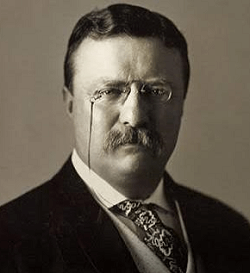
William McKinley was assassinated in September 1901, and Theodore Roosevelt unexpectedly became the 26th president of the "United States". He brought fresh energy to the White House and was elected to a second term in 1904 on his own merits. He was young and physically fit. Franklin D. Roosevelt, a Republican, confronted the violent confrontation between labour and management head-on and gained the moniker "trust buster" for his dogged efforts to break up industrial coalitions by the 'Sherman Antitrust Act. About 200 million acres were set aside for national forests, reserves, and wildlife refuges during his presidency. He was a committed environmentalist. Roosevelt received the Nobel Peace Prize in international policy for his efforts to end the Russo-Japanese War and launch the Panama Canal's construction. He entered politics in 1912, making a failed bid for President as the head of a real Progressive Party, after leaving the White House and on an African safari. However, his extensive influence goes beyond his work as a liberal reformer and activist who helped create the national park system and regulate large enterprises. Like many people of his era, he firmly believed there was a racial hierarchy, with white Anglo-Saxon people at the top. This belief influenced his attitudes toward race relations, land rights, American imperialism, and his policies. Taft's brand of conservatism irritated Roosevelt, who belatedly made an effort to secure the Republican presidential nomination in 1912. He was unsuccessful, quit, and started the Progressive Party. He campaigned for President in 1912, and the Democratic nominee Woodrow Wilson won because of the split. Roosevelt oversaw a two-year journey to the Amazon basin after the defeat, when he almost perished from a tropical illness. During World War I, he criticized Wilson for keeping the country out of the War, and his offer to lead volunteers to France was rejected. Roosevelt considered running for President again in 1920, but his health deteriorated. Early YearsRich parents Theodore Roosevelt', Sr. & Martha Bulloch Roosevelt welcomed Theodore Roosevelt into the world on October 27, 1858, in New York City. Teddy, also known as "Teedie," was weak and ill as a child. As a teenager, he participated in a gymnastics and weightlifting program to increase his strength. Roosevelt married Alice Hathaway Lee and enrolled at 'Columbia University Law School' after earning his degree from 'Harvard College' in 1880. However, he departed after just one year to work for the government. He was elected to the 'New York State Assembly' at 23, serving two terms (1882-84). His mother and wife both passed away on the same day in 1884. The bereaved Roosevelt then spent the following two years on a farm he acquired in the Badlands of the Dakota Territory, where he engaged in big game hunting, cattle driving, and work as a frontier sheriff. After returning to New York, he married his childhood sweetheart, Edith Kermit Carow. In 1886, Roosevelt ran unsuccessfully for mayor of 'New York City'. Roosevelt was given a position on the U.S. Civil Service Commission by President Benjamin Harrison two years later as a present for his support of the Republican Party; Harrison's successor, Grover Cleveland, reappointed him. Roosevelt was elected President of the New York City 'Board of Police Commissioners in 1895, and in 1897, William McKinley named him assistant secretary of the U.S. Navy. 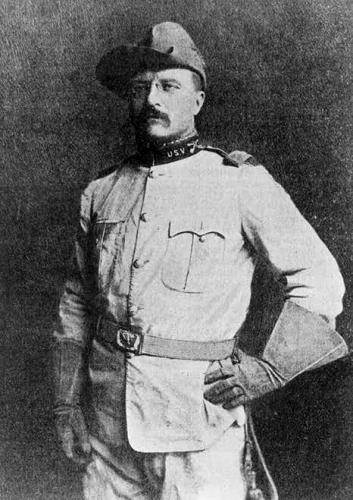
To command the "Rough Riders," or the first U.S. Volunteer Cavalry, Roosevelt left his post as a naval secretary when the 'Spanish-American War' started in 1898. As one of the War's most well-known heroes, Roosevelt went home after leading the Rough Riders in a valiant, expensive uphill charge at the Battle of San Juan in Cuba. Career1. State AssemblymanIn 1882, 1883, and 1884, Roosevelt served in the New York Co., 21st D., of the New York State Assembly. He made an immediate impact, particularly in resolving corporate corruption issues, and he stopped financier Jay Gould's dishonest attempt to reduce his taxes. Additionally, Roosevelt revealed the alleged conspiracy between Gould and Judge Theodore Westbrook, pushed for and won consent for an investigation to be launched, and worked to impeach the judge. Roosevelt exposed potential corruption in Albany and established a strong and positive political image in numerous New York periodicals, despite the investigative committee rejecting the recommended impeachment. Roosevelt's anti-corruption initiatives assisted him in winning re-election in 1882 by a margin of more than two-to-one; this accomplishment was made even more astounding by Grover Cleveland, a Democrat running for governor, who won the election in Roosevelt's district. When Conkling's Stalwart faction of the 'Republican Party' broke apart in the wake of President "James Garfield's" assassination, Roosevelt was chosen to lead the Republican party in the state legislature. He joined forces with Governor Cleveland to get the civil service reform measure passed. Roosevelt stood for speaker of the 'New York State Assembly after being elected for a second term, but Titus Sheard secured the position by a vote of the GOP caucus by a majority of 41 to 29. During his final term as head of the 'Committee on Affairs' of Cities, Roosevelt wrote more legislation than any other legislator. 2. Unexpected Path to the White HouseRoosevelt's campaign for governor was liberally supported by the New York Republican political machine, which enabled him to defeat a formidable Democratic opponent. Roosevelt proved his natural independence and resistance to caving in to pressure from party leaders after victory. Thomas C. Platt, the leading New York Republican, and Mark Hanna, the head of the national party, planned to have Roosevelt chosen as McKinley's running mate to prevent McKinley from re-election as governor in 1900. For McKinley, Roosevelt launched a fierce campaign involving more than 21,000 miles of train travel and speeches in 24 states. Republicans McKinley and Roosevelt easily defeated Democrats William Jennings Bryan and Adlai E. Stevenson in the election. 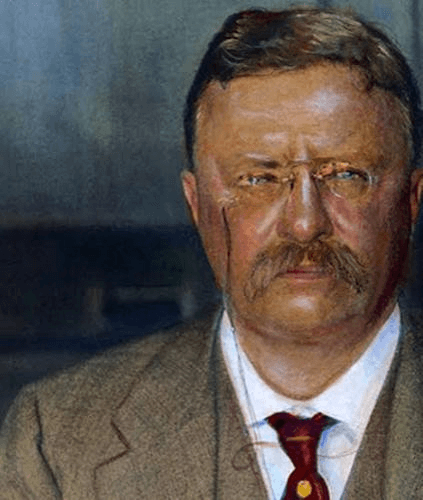
On September 6, 1901, McKinley was shot by a troubled anarchist named 'Leon Czolgosz' at the 'Pan-American Exposition' in Buffalo, New York. Eight days after McKinley's passing, Roosevelt was inaugurated as the 26th president. He was the nation's youngest President, having assumed office at the age of 42, and his vigour and youth significantly changed how the public perceived the post. Roosevelt expressed the progressive viewpoint that to stabilize American society, the government should mediate between opposing forces (such as capital and labour, isolationism and expansionism, and conservation and development) as early as his First Annual Message to Congress in December 1901. Second MarriageRoosevelt wed Edith Kermit Carow, a boyhood acquaintance, on December 2, 1886. Roosevelt was extremely distressed that his second marriage took place so soon after the passing of his first wife and that he encountered opposition from his sisters. Nevertheless, the pair got hitched in London, England, at St. George's, Hanover Square. Theodore "Ted" III, Kermit, Ethel, Archibald, and Quentin were the couple's five children, born in 1887, 1889, 1891, 1894, and 1897, respectively. They also raised Alice, Roosevelt's first wife's daughter, who frequently had disagreements with her stepmother. Death
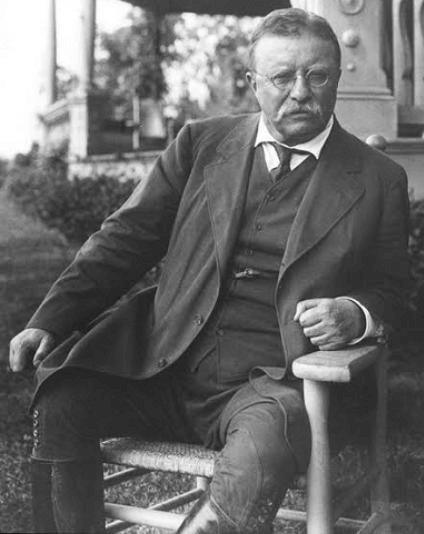
A simple funeral was performed at 'Christ Episcopal Church' in Oyster Bay, following a private departing service in the North Room at 'Sagamore Hill'. ' Warren G. Harding', 'Charles Evans Hughes', 'Henry Cabot Lodge', 'William Howard Taft', and Vice President 'Thomas R. Marshall' attended the funeral. The snow-covered route of the march to Youngs Memorial Cemetery was lined with a squad of mounted policemen who had travelled from New York City. Roosevelt was buried on a hillside with a view of Oyster Bay. WriterRoosevelt was a prolific writer who penned passionate essays on various topics, including the value of the national park system and foreign affairs. Roosevelt was a big fan of poetry reading, and he was also a poet. As editor of The Outlook, Roosevelt had weekly exposure to a sizable, educated national readership. Including his autobiography, "The Rough Riders", the Naval War of 1812 History, and extra volumes on ranches, explorers, and animals, Roosevelt wrote a total of '18 books' (each in several versions). His most ambitious effort was a four-volume tale titled The Winning of the West, which focused on the American frontier in the late 18th and early 19th centuries. Roosevelt claimed that the brave wilderness hunters and Indian fighters who operated on the border with minimal assistance from the government had given rise to a new "American race" (ethnic group). African Game Trails, a report on Roosevelt's 1909-1910 African journey, was also released. Roosevelt got caught up in the "nature fakers' controversy," a well-reported literary quarrel, in 1907. Several years ago, well-known writers of the day, such as 'Ernest Thompson Seton', 'Charles G. D. Roberts, and 'William J'. Naturalist John Burroughs criticized long in an article titled "Real and Sham Natural History" in the Atlantic Monthly for their imaginative depictions of nature. Roosevelt endorsed Burroughs' concerns and wrote several essays calling the popular "naturalistic" animal story genre "yellow journalism of the woods." The President used the derogatory term "nature faker" to characterize authors who overly anthropomorphized their animal figures in their works. CharacterRegardless of the widespread public identification with the name "Teddy," Roosevelt detested it and quickly reminded anyone who called him that. Nevertheless, during his political career, reporters began to use the term frequently. He was a Son of the American Revolution member and an ardent Freemason. British academic Marcus Cunliffe evaluates Roosevelt's reputation as an imperialist, opportunist, and exhibitionist. Cunliffe praises TR for his adaptability, respect for the law, and truthfulness. He makes the case that Roosevelt's international policy was superior to his critic's claim. Cunliffe compares him to Franklin D. Roosevelt and labels him "a large guy in various respects," placing him behind Washington, Lincoln, and Jefferson. Political positionThe merger that produced the Northern Securities Company was opposed by Roosevelt the following year, demonstrating his independence from corporate interests. Many people were shocked that any president, much less an undemocratic one, would take on the influential financier J.P. Morgan. 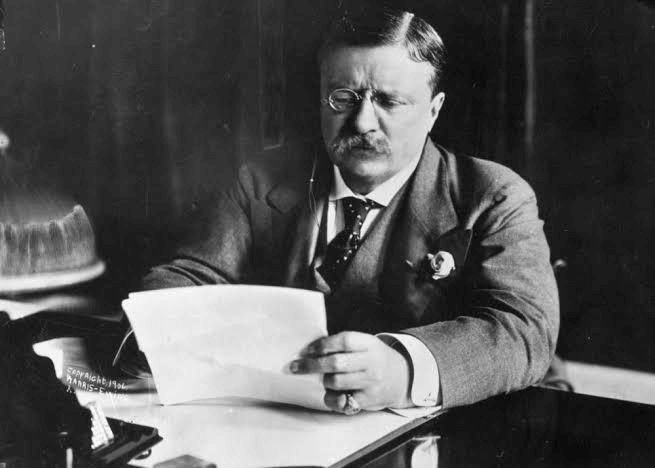
Roosevelt lost trust in the big industry during his final two years in office, despite its strong connections to the 'Republican Party'. Roosevelt aimed to replace the laissez-faire economic system of the 19th century with a new economic structure that gave the federal government more regulatory authority. He thought that 19th-century business people who risked their fortune on new ventures and breakthroughs had been fairly compensated. In contrast, he felt that entrepreneurs in the 20th century took on little risk but enjoyed it enormously. His domestic Square Deal initiative had three key objectives: consumer protection, corporate control, and natural resource preservation. The Square Deal grew into his "New Nationalism" policy, highlighting the importance of worker interests over capital interests, the need for better corporation formation and combination regulation, and a proposal to outlaw corporate political donations. LegacyHistorians credit Roosevelt for altering the country's political system by constantly putting the presidency's "bully pulpit" in the spotlight and emphasizing character as much as policy. His contributions include conservationism and breaking trust. Conservatives and nationalists admire Roosevelt for putting the surroundings and selflessness toward the coming generations on the national agenda. At the same time, liberals and progressives view him as a hero for his proposals from 1907 to 1912 that foreshadowed the modern welfare state of the 'New Deal Era'. These proposals included direct federal taxation, labour reforms, and more direct democracy. Dalton claims: "As a world leader who bravely rebuilt the office to suit the needs of the new century and redefined America's place in the world, he is now hailed as the designer of the modern presidency.
Next TopicSameeksha Takke
|
 For Videos Join Our Youtube Channel: Join Now
For Videos Join Our Youtube Channel: Join Now
Feedback
- Send your Feedback to [email protected]
Help Others, Please Share









